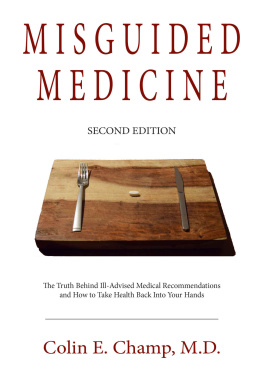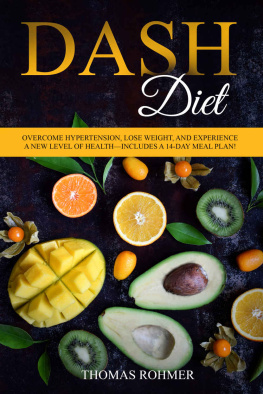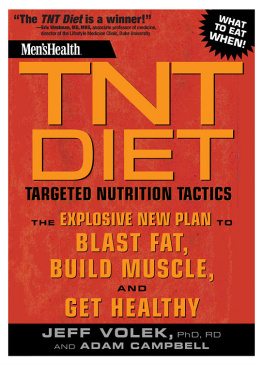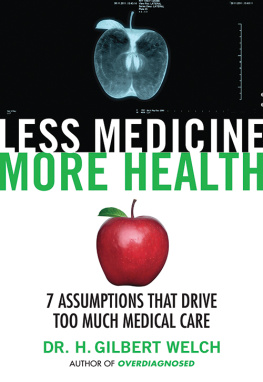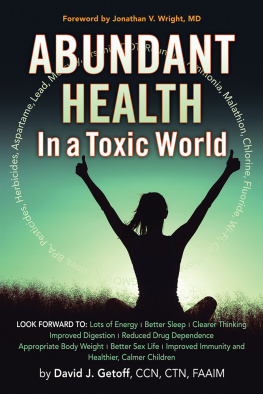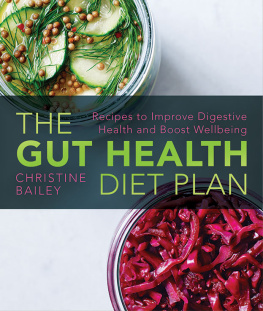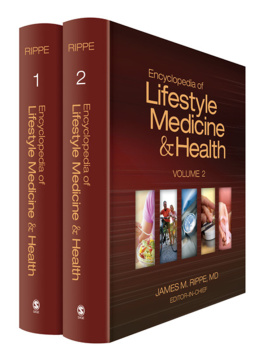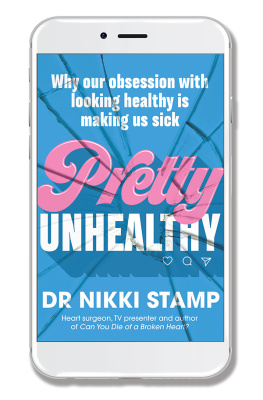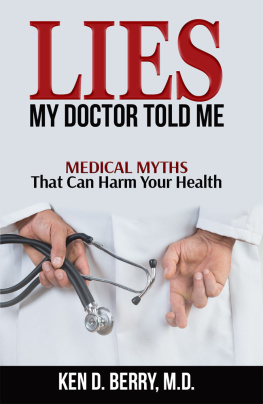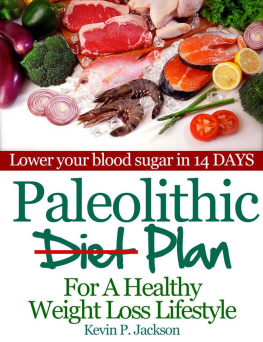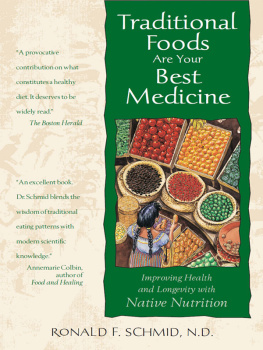Colin E. Champ - Misguided Medicine
Here you can read online Colin E. Champ - Misguided Medicine full text of the book (entire story) in english for free. Download pdf and epub, get meaning, cover and reviews about this ebook. year: 2016, publisher: CDR Health and Nutrition, genre: Science. Description of the work, (preface) as well as reviews are available. Best literature library LitArk.com created for fans of good reading and offers a wide selection of genres:
Romance novel
Science fiction
Adventure
Detective
Science
History
Home and family
Prose
Art
Politics
Computer
Non-fiction
Religion
Business
Children
Humor
Choose a favorite category and find really read worthwhile books. Enjoy immersion in the world of imagination, feel the emotions of the characters or learn something new for yourself, make an fascinating discovery.
- Book:Misguided Medicine
- Author:
- Publisher:CDR Health and Nutrition
- Genre:
- Year:2016
- Rating:4 / 5
- Favourites:Add to favourites
- Your mark:
- 80
- 1
- 2
- 3
- 4
- 5
Misguided Medicine: summary, description and annotation
We offer to read an annotation, description, summary or preface (depends on what the author of the book "Misguided Medicine" wrote himself). If you haven't found the necessary information about the book — write in the comments, we will try to find it.
Misguided Medicine — read online for free the complete book (whole text) full work
Below is the text of the book, divided by pages. System saving the place of the last page read, allows you to conveniently read the book "Misguided Medicine" online for free, without having to search again every time where you left off. Put a bookmark, and you can go to the page where you finished reading at any time.
Font size:
Interval:
Bookmark:
MISGUIDED MEDICINE
SECOND EDITION
MISGUIDED
MEDICINE
SECOND EDITION
Colin E. Champ, M.D.
CDR Health and Nutrition, LLC
Pittsburgh, PA
Copyright 2016 CDR Health and Nutrition, LLC
Published by CDR Health and Nutrition, LLC
Author photograph by Dan Landoni
The material contained within this book is strictly for informational and educational purposes only and is not intended or implied to be a substitute for professional medical advice, diagnosis, or treatment. If you have questions about your medical condition, you should seek the advice of a physician or qualified health provider. We urge you to not disregard, avoid, or delay in obtaining professional medical advice because of something you have read in this book. All usage of the information presented here is at the readers discretion and the author specifically disclaims any and all liability arising directly or indirectly from the usage of any and all information contained within.
All rights reserved. No part of this book may be reproduced, stored in a retrieval system, transmitted in any form or by any means, mechanical or electronic, including recording, photocopying, scanning, or by any storage system without written permission by the author.
For information about special discounts for bulk purchases or to book an event with the author contact
admin@colinchamp.com
ISBN 13: 978-0692629307
ISBN-10: 0692629300
T O
J OHN R EICHL (1917-2014),
who taught me at a young age and throughout my life about the importance of taking my wellbeing into my own hands by staying healthy both physically and mentally.
T O
J USTIN B ROGLIE (1990-2014),
whose insightfulness and kindness knew no limits.
Contents
Preface
Introduction
Medicine 15
P ART O NE: The Formation of the
Standard American Diet
- THE WAR ON FAT
- GRAINS AND THE FOOD PYRAMID: FATS REPLACEMENT
- THE ADDICTIVE NATURE OF RECOMMENDED
FOODS
- THE THERMODYNAMICS OF EATING
- THE NON-NUTRIENT AND ANTI-NUTRIENT BENEFITS OF GRAINS
P ART T WO: The Recall on Fat
and Its Advantages
- THE CHEMISTRY OF FATS AND OILS
- THE INDUSTRIAL PROCESS OF CREATING VEGETABLE OILS: CHEMICAL REFINEMENT
- CONJUGATED LINOLEIC ACID FORGOTTEN ALL Y IN THE BATTLE AGAINST BEEF
- MAXIMIZING OMEGA-3 INTAKE: TIPPING THE BALANCE BACK TOWARDS HEALTH
- COOKING WITH HEALTHY FAT
- THE RED (MEAT) SCARE
P ART T HREE: Guiding Your Lifestyle
- THE VITAMIN TAKEOVER
- CALCIUM: PROTECTING BONES OR DAMAGING THE HEART?
- THE MARATHON MOVEMENT
- THE SUN: CAUSING CANCER OR PROVIDING
HEALTH?
- SALT: COLLATERAL DAMAGE IN THE WAR ON FAT
- ANTIOXIDANTS: A PRIMER 235
- CLOSING
References
Further Reading 299
Index 305
Acknowledgments
About the Author
*This version of Misguided Medicine: Second Edition was altered for the Kindle version. Depending on the reader and sizes, chapter and index page numbers may be altered.
Preface
During my undergraduate studies at the Massachusetts Institute of Technology, I learned the value of critical thinking. Our examinations were almost always of the open book variety, and anything that could be found in our textbooks was never asked of us on those tests. In stark contrast, my rigorous academic training in medical school required the rote memorization of immense amounts of information. While appropriate, this method of learning encouraged me and my peers to blindly follow what was taught to us, to avoid asking questions and instead focus on regurgitating information.
Physicians, patients, and even scientists sometimes forget to ask questions and challenge what they have been taught or what they may already know. Failure to challenge the status quo can lead these respected figures to perpetuate the spread of wholly or partially inaccurate information. This book was compiled over the course of my winding educational and career paths via the constant reassessment of what I was being taught and what I was supposed to pass on to patients as healthy recommendations.
When I took my Hippocratic oath as a physician to prescribe regimens for the good of my patients according to my ability and my judgment and never do harm to anyone, I took very seriously my commitment to constantly seeking the most accurate information for my patients. Because of this, I decided to write this book, in order to ensure that those of us who are not medical experts may be enlightened with information outside of common perceptions. I also realize the importance of each and every one of my patients taking an active role in their health and being their own physician first and foremost, then calling for an opinion from their doctor only when necessary.
Colin E. Champ, M.D.
MISGUIDED MEDICINE
One of the first duties of the physician is to educate the masses not to take medicine.
William Osler,
Founding Father of
Johns Hopkins Hospital
Introduction
Fifty percent of medicine is wrong. 1,2 Yes, you read that right - an astonishing half of what doctors tell you is inaccurate. However, we as medical professionals have known for years that medicine is part science and part art, and any model with as many complex variables as the human body is impossible to master via science alone. This failure is not necessarily the fault of the treating physician, or even due to shortcomings in the medicine; rather, it is due to a combination of the scientific method, bias, financial incentive, and of course, the human drive to advance science. In fact, most medical studies are doomed to fail from the start,and the final results of many of these studies leave physicians and outside observers even more confused than before the study took place. Making matters worse, the press can get wind of these convoluted studies and misrepresent their outcomes, which only serves to amplify public confusion.
In actuality, wrong may be too strong of a word choice. More appropriately, medicine is often unfounded . In other words, cutting-edge findings culled from medical studies are often premature and need some refining. Unfortunately, in todays technologically driven mass-media society, these underdeveloped findings often become science before they are properly analyzed and polished. Much like opening a fine wine before it has matured, results from medical studies are exposed too soon to the public; subsequently, they end up in doctors offices as recommendations, or worse yet, in the hands of insurance companies as mandates for setting coverage policy.
This premature exposure of information leads to misguided medicine, confusion, corresponding corrections of that misinformation, and recommendations that change as often as the weather. On Monday, fiber is extremely beneficial for ones health; by Wednesday, fiber is irrelevant to ones well-being. Over fifty percent of medical studies - yes, including the ones from esteemed academic institutions with the worlds sharpest and most well-funded research scientists - will contradict themselves at some point in the future.
As a physician, I find such undercooked and half-baked morsels of information to be tenuous. Basically, when a doctor recommends a treatment to a patient based on a randomized trial, he or she is theoretically providing the patient incorrect recommendations nearly every other time. Preventative recommendations are even more difficult to make from current studies. If the patient were to flip a coin to determine the advice to take, he or she would derive the same benefit.
Whether you make a conscious decision to avoid games of chance when it comes to your health, or youve simply taken a proactive stance to maximize your health where possible, it should be clear by now that healthy living must be taken into your own hands. While physicians undoubtedly provide benefit to aid in preventative care along with support once pathology occurs, real health is derived from proactively taking health into ones own hands, not under the control of others who knowingly or unknowingly are leaving it to chance or unfounded research to decide what is best. Expert outsiders may be able to guide individuals, but real health lies within.
Next pageFont size:
Interval:
Bookmark:
Similar books «Misguided Medicine»
Look at similar books to Misguided Medicine. We have selected literature similar in name and meaning in the hope of providing readers with more options to find new, interesting, not yet read works.
Discussion, reviews of the book Misguided Medicine and just readers' own opinions. Leave your comments, write what you think about the work, its meaning or the main characters. Specify what exactly you liked and what you didn't like, and why you think so.

